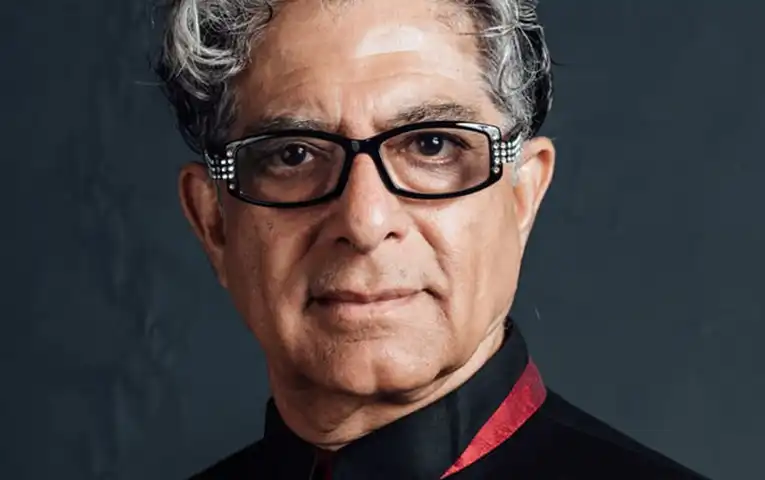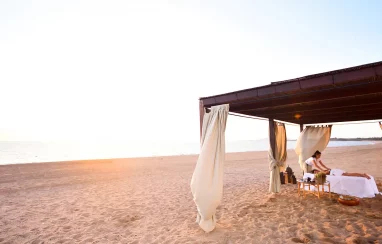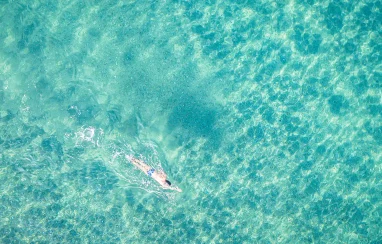By Simos Kavalieratos
He has written over ninety books, traveled to India alongside George Harrison of the Beatles, and taught meditation to Madonna. Deepak Chopra, a hugely influential figure in self-help and spirituality, has captivated millions of people, celebrities and non-celebrities alike. Born in New Delhi in 1946, he later moved to the United States and began his career as an endocrinologist. However, his path took an unexpected turn when he met Maharishi Mahesh Yogi, the founder of Transcendental Meditation. This encounter sparked Chopra’s interest in alternative healing practices and led him on a life-changing journey.
In the late 1980s, his fame skyrocketed thanks to his appearances on “Oprah,” solidifying his position as an authority in the field of mind-body wellness. Since then, through his books and lectures, he has inspired countless individuals to embark on a journey of self-discovery and seek a deeper understanding of their own spirituality. We met virtually for an exclusive interview before his retreat at W Costa Navarino.

How do you feel about coming to Greece?
I’ve been to Greece many times over the years. I really enjoy reading ancient Greek philosophy, including the works of Plato and Aristotle, and Ι respect Greece as the birthplace of philosophy and civilization as we know it in the Western world. I have a very personal connection with Greece. I also love the food.
Recently, you created an artificial intelligence app called Digital Deepak, where your avatar responds like you would. We often consider technology to be an obstacle to mindfulness and spiritual development. What is your opinion on the matter?
No, it’s not something I believe. We can understand many things about human existence through technology, especially through artificial intelligence. Artificial intelligence has infinite possibilities, but it does not have consciousness. It does not have existential problems. It doesn’t reproduce, feel hunger or thirst, or fear death. But it’s also not wise. Wisdom comes through super-intelligence and a deep understanding of spirituality. If we manage to combine these two, then the possibilities are endless.
Do you feel any sense of responsibility knowing that you affect the lives of other people?
At this point in my life, any approval, affirmation, or criticism does not concern me. It doesn’t matter to me. I am 76 years old, and my next chapter is death. I have devoted my entire life to exploring consciousness. I have received criticism, flattery, and praise in equal measure. I have even been called a “pseudo-scientist.” It’s too late for me to care about what others think of me. Therefore, I don’t feel any responsibility. I share what I have learned with the world, and it just happens that many people appreciate the sharing.
I understand that you are very adamant about your beliefs. Have you ever had doubts in the past? Or a crisis of faith?
Faith is insecurity in disguise. If I were to ask you, “Do you believe in electricity?” you would respond, “Yes, because I see the light coming from the lamp, I see that my computer is functioning, and I see the washing machine moving.” You would respond similarly about gravity. You perceive their truth or existence through experience. Therefore, when you have experienced the sensation of transcendence, you don’t need to believe in anything. You simply experience it.
How would you describe this feeling of transcendence?
Transcendence is the absence of thoughts. And when there are no thoughts, there are no sensations, emotions, or images. However, there is a lively vitality of pure existence. It is a feeling that knows no boundaries. It is an experience beyond space. You feel one with all living beings. It is a sense of joy, interconnectedness, love, peace, compassion, and kindness.
Will those who participate in the retreat experience this in the end?
I have no expectations. Each person reacts differently, but I hope some will leave with a sense of freedom and awakening, away from the state we call “reality.” But it’s not reality; it is a projection of our consciousness. I hope some can even touch fragments of actual existence. I will do my best and leave the details to the universe.
As a doctor, how do you evaluate the approach of modern medicine? Also, is it true that you have never been sick?
Medicine today is reductionist yet effective in treating illnesses. If someone has pneumonia, peritonitis, or a broken leg, Western medicine can save their life. However, 95% of diseases, especially chronic ones, are epigenetic, not genetic. Therefore, if someone follows a lifestyle of rest, minimal stress levels, adequate sleep, and proper nutrition, there is no reason to become ill. I have always believed that illness is optional, except for the 5% that is genetic. But I think that in the future, we will find a solution to that, too, if we don’t totally perish from the destruction of the planet, war, and terrorism. By the way, I had measles and chickenpox as a child.
You mentioned some issues that are of concern to humanity at the present moment. In your opinion, what is the primary issue plaguing the world today? And how would our world be if people followed your fundamental principles?
The main issue is the socially induced illusion of the separate mind, which is the primary cause of divisiveness, wars, social inequality, environmental destruction, and the discontent that pervades us as a species. If people woke up one day and realized they were one with everything, that they are not separate entities, we would live in a more peaceful, sustainable, healthy, and happy world.
Have you ever considered getting involved in politics?
No, I consider it a waste of time. I have supported politicians from the Democratic Party in the past, and I still support them, but I realized that engaging in politics is not for me, either directly or indirectly, because it inevitably leads to polarization. I often think about what Plato wrote. Many people may not know that Plato was the greatest critic of democracy. He said that democracy is the rule of the mob. When you learn music, you trust someone who knows music. When you learn mathematics, you trust someone who knows mathematics. However, when the time comes to choose a political leader, we accept that everyone is equally qualified to lead. He also rejected oligarchy, as it led to tyranny. His solution was the institution of the Republic, where philosophers would be trained as leaders. It was a remarkable idea, but it still needs to be implemented.
Do you follow the pop culture at all? Do you have any guilty pleasures? Singers, movies, TV shows…
I have been closely connected with many musicians, such as The Beatles and Michael Jackson. I still have relationships with contemporary artists, but the truth is I still prefer what came out in the ’60s and ’70s, like The Beatles, The Rolling Stones, Paul McCartney, and George Harrison, who was also a good friend of mine. As you can see, my preferences haven’t changed.
You have been married since the ’70s. As you will cover the subject of relationships at the retreat, what do you believe is the secret to a successful marriage?
Give up the need to always be right and avoid arguments. That’s it.
So, you don’t ever argue with your wife? How do you manage it?
No, I don’t argue with anyone these days, let alone with my wife and children. I ask myself the following question: Do I want to be right, or do I want to be happy? And then, I put things into perspective.
It is said that you live in a health-centric condominium in Manhattan. What does this entail?
It has lighting that follows the body’s circadian rhythms, filtered water, air filtration systems, and posture-supportive flooring, and the architecture adheres to sustainability principles. These homes go beyond what we consider green and are designed to optimize the biology of the people living there.
Since we are talking about well-being, what are the three most essential tips you would give someone looking to improve their diet?
Follow the principles of the Mediterranean diet, which is based on fruits and vegetables, and try to incorporate as much variety and color as possible. Eat mindfully. When you feel hungry, ask yourself if you are starving or trying to fulfill some emotional need.
What legacy do you want to leave behind?
None. It is enough for me if someone’s life is improved. I don’t care if people remember Deepak Chopra. He is a fictional character, and they don’t need legacies.
INFO
Deepak Chopra will be coming to W Costa Navarino from September 28th to October 2nd for a retreat organized by Travelgems, focusing on the future of well-being. For more information, you can visit travelgems.com. This interview was initially published in “K,” the Sunday magazine of Kathimerini, the leading newspaper in Greece.

